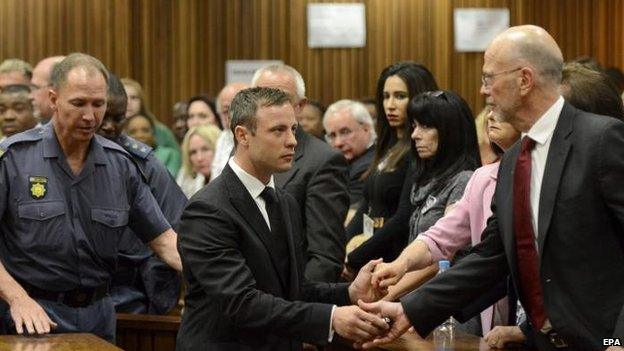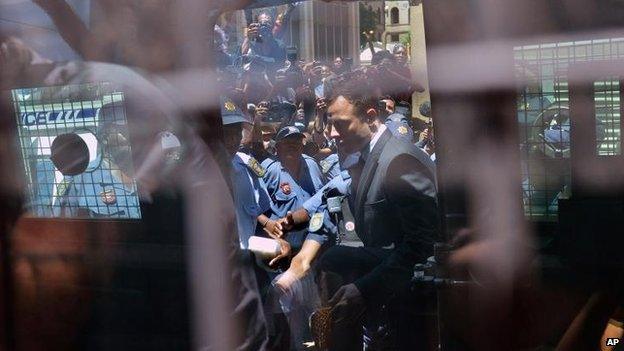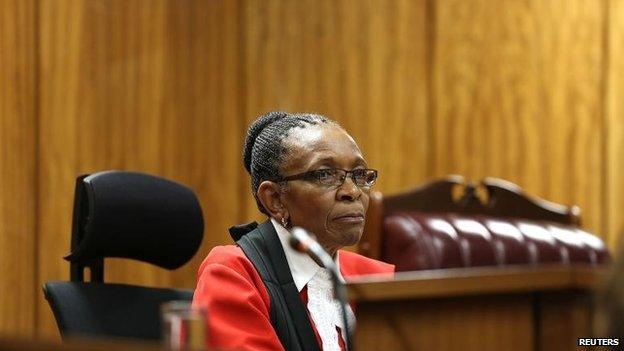Oscar Pistorius given five years for Reeva Steenkamp death
- Published
Judge Thokozile Masipa hands down the sentence
South African athlete Oscar Pistorius has been given five years in jail for killing his girlfriend Reeva Steenkamp.
Judge Thokozile Masipa also gave Pistorius a three-year suspended sentence for a firearms charge.
The parents of Reeva Steenkamp told the BBC they were happy with the sentence and relieved the case was over. The defence said it expected Pistorius to serve about 10 months in prison.
Pistorius was convicted of culpable homicide but cleared of murder.
Prosecutors had called for a minimum 10-year term, and the defence had argued for community service and house arrest.
'Feeling of unease'
Pistorius showed little reaction to the sentence other than to wipe his eyes before being led away to the cells downstairs.
He was then driven away from court in a police van to Pretoria's Kgosi Mampuru prison.
It is expected that he will be held in a one-man cell in the hospital wing.
Correctional services spokesman Manelisi Wolela later told AFP news agency Pistorius was "already accommodated at Kgosi Mampuru".
Defence lawyer Barry Roux said his client was expected to serve 10 months in prison, with the rest under house arrest.
Dup De Bruyn, a lawyer for the Steenkamp family, told Reuters that "justice was served", although he believed Pistorius would probably serve two years.

At the scene: Andrew Harding, BBC News, Pretoria
Before he went down the stairs and out of court, Oscar Pistorius slipped off his expensive watch and handed it to a relative. It seems the athlete probably knew his sentence beforehand, which helps explains the subdued atmosphere in court today.
This case has revealed plenty about South Africa - its gun culture, the strengths and inadequacies of its police and prisons. But above all it has been a simple story, about the rise and fall of a global icon.
As the crowds and cameras drift away from the courthouse, what lingers is the sense of waste. Of lives and careers for sure. But of time too.
A man and a woman went into a bathroom. Only one came out alive. As the judge made clear - the trial should have been over in a matter of weeks. Instead it turned into a tortuous, overwrought epic.

Pistorius's uncle, Arnold, said: "We accept the judgment. Oscar will embrace the opportunity to pay back to society."
He appealed to the media to "accept the ruling of court and let us move forward in this process and give us some degree of dignity and privacy".
He said the family would support and guide the athlete as he served his sentence.
The BBC's Nomsa Maseko, outside court, says opinion there was divided on the sentence, with some saying it was too light, others that it was fair.
Reeva Steenkamp's mother, June, said she believed justice has been served
"I hope Oscar will begin his own healing process as he walks down the path of restoration" - Arnold Pistorius
Judge Masipa said she considered her sentence "fair and just, both to society and to the accused".
She said: "A non-custodial sentence would send the wrong message to the community. On the other hand, a long sentence would also not be appropriate either, as it would lack the element of mercy."
Judge Masipa said that nothing she could say or do could bring back Reeva Steenkamp, but "hopefully, this judgment on sentence shall provide some sort of closure for the family".
The judge begun reading her decision by saying there must be a balance between retribution, deterrence and rehabilitation.
In summarising the evidence, she described defence witness and social worker Annette Vergeer as "slapdash and disappointing".

Oscar Pistorius holds the hands of family members as he is led away

He was driven away in a prison van

Judge Masipa has ruled in a trial that has captured public attention in South Africa and beyond
Ms Vergeer had argued Pistorius would be "a lot more vulnerable than the normal man" in jail.
But Judge Masipa said she was sure prisons were equipped to cater for the requirements of a special needs inmate.
She also said she had a "feeling of unease" at what she called an overemphasis on the athlete's vulnerability.
However, she said Pistorius had made an "enormous contribution to society", in his charity work and in changing the public perception of disability.
The judge also said: "It would be a sad day for this country if an impression were to be created that there was one law for the poor and disadvantaged, and another for the rich and famous."
The three-year suspended term was for unlawfully firing a gun in a restaurant, in a separate incident before the Steenkamp killing.

Oscar Pistorius shot dead Reeva Steenkamp on Valentine's Day last year
The case may not yet be over, as both prosecution and defence have the right to appeal.
The prosecution service said it had not yet decided and the defence has not yet commented.
The International Paralympic Committee told the BBC it would not allow Pistorius to run at any of its events for five years, even if he were released early.
Pistorius, 27, an amputee sprinter who became the first athlete to compete in the Olympic and Paralympic Games, killed Ms Steenkamp on Valentine's Day last year.
He says he shot her by mistake, fearing there was an intruder in his house in Pretoria.
Ms Steenkamp, a 29-year-old model, reality TV star and law graduate, was hit three times by bullets fired by Pistorius through a toilet door.
Inside Oscar Pistorius's home
-
×
-
Balcony
×Mr Pistorius said he and Ms Steenkamp had dinner at about 19:00 before going to bed at 21:00. He said he woke in the early hours, spoke briefly to his girlfriend and got up to close the sliding door and curtains.
Judge Thokozile Masipa questioned the reliability of several witnesses who said they heard screams and gunshots between about 03:12 and 03:17, saying most had 'got facts wrong'.
-
Bathroom noise
×Mr Pistorius said he heard the bathroom window sliding open and believed that an intruder, or intruders, had entered the bathroom through a window which was not fitted with burglar bars.
Mr Pistorius said he grabbed his firearm and told Ms Steenkamp, who he thought was still in bed, to call the police.
The judge said it made no sense that Ms Steenkamp did not hear him scream 'Get out' or call the police, as she had her mobile phone with her.
-
Shooting
×Mr Pistorius could see the bathroom window was open and toilet door closed. He said he did not know whether the intruders were outside on a ladder or in the toilet.
He had his firearm in front of him, he heard a movement inside the toilet and thought whoever was inside was coming out to attack him.
'Before I knew it, I had fired four shots at the door,' he said.
The judge said she did not accept that Mr Pistorius fired the gun by accident or before he knew what was happening. She said he had armed himself with a lethal weapon and clearly wanted to use it. The other question, she said, was why he fired not one, but four shots before he ran back to the room to try to find Ms Steenkamp.
-
Bedroom
×Mr Pistorius said he went back to the bedroom and noticed that Ms Steenkamp was not there.
Mr Pistorius said this was when he realised she could have been in the toilet and rushed back to the bathroom.
-
Toilet door
×Mr Pistorius said he screamed for help and went back to the bathroom where he found the toilet was locked. He returned to the bedroom, pulled on his prosthetic legs and turned on the lights before bashing in the toilet door with a cricket bat.
When the door panel broke, he found the key and unlocked the door and found Ms Steenkamp slumped on the floor with her head on the toilet bowl. He then carried her downstairs, where he was met by neighbours.
3D animation of the apartment
Note: 3D model based on floor plan presented at Pretoria Magistrates' Court in 2013, Agencies and Eyewitness News.